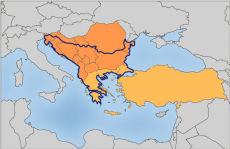
Disraeli was keen to take the initiative proposed a conference in Constantinople (1876-7) in an attempt to stick to his policy of keeping the Turkish intact. Agreements were reached that Bosnia and Herzegovina unite under nominal Turkish rule that might put an end to the revolts however the Sultan of Turkey refused to accept any agreements and because of this Russia declared war with them in 1877. Up until now Britain’s policy in Europe including the Balkans was to avoid force unless absolutely necessary, and in keeping with this policy when Russia threatened Constantinople in 1878 a British fleet was sent to Constantinople and forced Russia to ceasefire and both nations to start peace talks. The Treaty of San Stephano (1878) was proposed however it didn’t support British policy as the Turkish Empire would have been majorly divided and because Bulgaria would’ve increased in size the stretch of land protecting Constantinople was very short. These factors therefore made the Turkish Empire susceptible to attack contrasting with the continuous British policy of protecting Turkey. Also Bulgaria’s increase also meant that it had access to the Aegean Sea providing Russia easy access to the Mediterranean, the Suez Canal and India. Therefore Britain called for a second conference; the Congress of Berlin and due to Disraeli’s fierce diplomacy his policy had left a clear mark in the Balkans. The Turkish Empire was now far more unitary, so therefore once again acted as the blockade against Russian Expansion and was now less susceptible to being separated. In doing so he also maintained balance of power in Europe Further more Britain gained Cyprus an important strategic point for Britain as it could be used to defend the Suez Canal and if necessary part of Eastern Europe.
Salisbury’s approach to the Eastern Question was similar to Disraeli’s because he too believed in the strength of diplomacy and he also worked with other powers such as Austria, Italy and Germany to counter Russia in situations like the revolt of Eastern Rumelia in against its Sultan overlord and replaced this with unity with Bulgaria. The major powers wanted to return to the status quo including Russia as its ruler was uninterested in cooperating with other nations. Britain worked with Austria and Germany and forced Russia to accept an independent candidate; Prince Ferdinand.
Due to the fact that the Dreikaiserbund was at an end and so Britain continued working with the triple alliance powers and in 1887 drew up the agreement but due to the fact that the French and Russians pressurised the Sultan into demanding more and the agreement collapsed. Fortunately a second agreement was drawn up in December by which Britain, Austria and Italy agreed to work together to defend the Balkans and the Straits against Russia. However by 1894 Salisbury realised the collapse of the Ottoman Empire was inevitable and he was powerless to stop it due to a lack of support from Russia and so turned his focus towards Egypt, marking a major change in British policy towards the Balkans.
In conclusion, British policy towards the Balkans between 1856 and 1902 remained largely the same. Palmerstone, although he never became directly involved realised that he had to defend the Balkans due to the threat of a Russian fleet at least through diplomacy. The case was similar with Gladstone, however, he realised that direct involvement was not possible due to a weak British army giving him little options as to how to combat Russia. Disraeli like Palmerstone kept a widely diplomatic approach with the Conference of Berlin in stopping a Russian expansion and he started working with the Austrians due to the break-up of the Dreikaiserbund which Salisbury continued to build upon and in doing so gained the support of multiple powers in the protection of the Balkans. Therefore, despite slightly alternating approaches in diplomacy, all retained the policy that the defence of the Balkans was important, particularly for the sake of keeping the Turkish Empire intact and stopping the Russians gaining control of the Straits and Mediterranean, which would threaten the British Empire.
Image: By Original uploader and author was Perconte at de.wikipedia [CC BY-SA 2.5 (http://creativecommons.org/licenses/by-sa/2.5)], via Wikimedia Commons

0 Comment:
Be the first one to comment on this article.